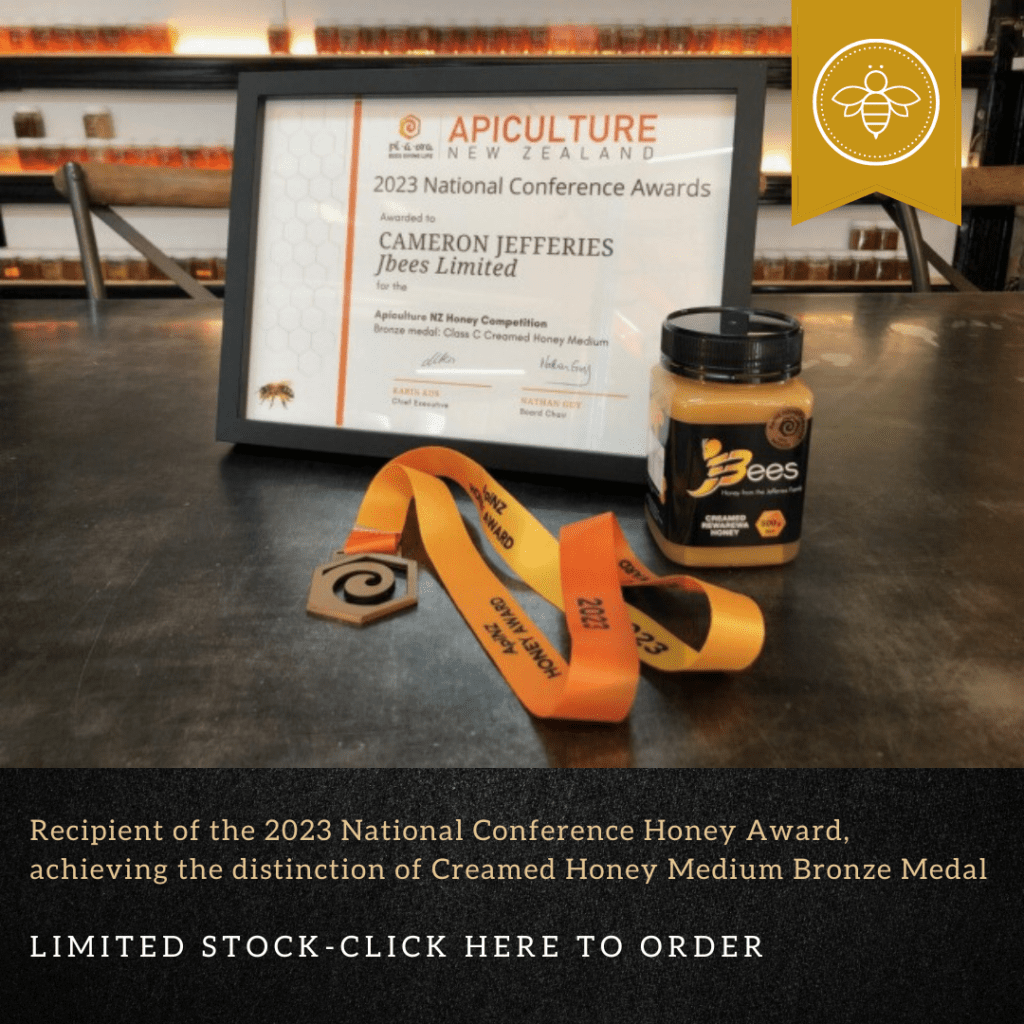Bees and Honey from the Jefferies Family
Frequently Asked Questions
What is Manuka Honey from New Zealand?
Manuka honey from New Zealand is a type of honey derived from the nectar of the Manuka bush (or Leptospermum scoparium), which grows extensively around coastal areas of New Zealand. It is a natural sweetener with unique properties that earned it a reputation for being a super-food. Manuka honey is made when bees collect nectar from the Manuka tree, which blooms for only 12 days a year, making it a rare and exclusive product. New Zealand is famous for its Manuka honey, which is highly sought after worldwide for its scientifically proven health benefits
What makes Manuka honey from New Zealand different from other types of honey?
All honey contains a range of proteins, vitamins, minerals, enzymes, phenolic, but Manuka honey has unique properties that make it more than just a natural sweetener. It has scientifically proven health benefits and is perfect for bringing a little bit of something special into your day.
What are the health benefits of Manuka honey from New Zealand
Manuka honey from New Zealand has several health benefits. It is a natural antibiotic that can be used to ease a sore throat, improve digestion, and treat minor cuts and acne. It has potent antibacterial properties, antiviral, anti-inflammatory, and antioxidant benefits.
Manuka honey is used as a natural ointment for wounds of all kinds, and it has been hailed as a go-to germ fighter in an age of resistance to conventional antibiotics. It can serve as a dressing for wounds, sores, and burns, and it helps prevent infection due to its antibacterial and antiviral properties.
Clinical data shows that Manuka honey helps prevent infection due to its antibacterial and antiviral. It has even demonstrated antibiotic properties when applied to already infected areas.
Manuka honey has been promoted as a potential treatment for several other conditions, and there is increasing evidence for the use of Manuka honey in treating inflammatory bowel disease, gastric ulcers, periodontal disease, and coughs due to upper respiratory infections
How is Manuka honey from New Zealand produced?
Manuka honey from New Zealand is produced by bees collecting nectar from the Manuka tree (Leptospermum scoparium), which is a native New Zealand tree. The Manuka tree has a white flower, sometimes tinged with pink. The Manuka trees start blooming from mid-December to mid-January, depending on the season.
The honey production has nearly doubled in a little over a decade, and total New Zealand honey exports now top $350 million a year, with Manuka honey accounting for 70-75% of the total value.
The reputation for honey production and export rests on the integrity of the products and the credibility of the systems.
What is the UMF rating system used to grade Manuka honey from New Zealand?
The UMF (Unique Manuka Factor) rating system is used to grade Manuka honey from New Zealand. The UMF rating system is the only quality and rating system that independently certifies the presence and quality of all factors that make New Zealand Manuka honey unique.
The UMF Four Factor Quality Assurance Test independently certifies the quality factors that matter and summarizes them in a single figure. The UMF values start at UMF 5+ and can go as high as UMF 30+ in rare Manuka honeys. Grades between UMF 5 and UMF 10 are low-grade Manuka honey, while mid-grades of UMF 10 to UMF 15 are therapeutic. The higher the UMF rating, the more antibacterial activity Manuka honey has, and the more potent it is.
The UMF number on the label represents the amount of MGO in the bottle. Other measurement systems used in New Zealand include MGS (Molan Gold Standard), K-Factor, and Bio Active. The grading system for New Zealand Manuka honey is very complex, and several different systems can be used
What is the difference between MGO and UMF?
UMF is an indicator of the quality and purity of mānuka honey. MGO stands for methylglyoxal, the naturally occurring compound that makes mānuka honey so unique. An MGO rating is a standardised measure of methylglyoxal content and is an indicator of quality.
UMF™ & MGO Comparison Table
|
UMF |
MGO |
|
5+ |
83 |
|
10+ |
263 |
|
12+ |
356 |
|
15+ |
514 |
|
18+ |
696 |
|
20+ |
829 |
How should I store Manuka honey from New Zealand?
Manuka honey from New Zealand should be stored in a cool, dry place below 25°C, such as a kitchen cupboard or pantry, out of direct sunlight. The ideal temperature for storing honey is between 10-20°C/50-68°F, as this temperature will keep it stable in the jar and not let it get too runny.
It is recommended to use the original container the honey came in, though any glass jar or food-safe plastic container will work. Just avoid storing honey in metal, because it can oxidize.
The lid should be kept tightly closed after each use. It is not recommended to refrigerate Manuka honey, as it can cause it to solidify. Manuka honey can last for a long time if stored properly
What are some ways to use Manuka honey from New Zealand?
Manuka honey from New Zealand can be used in various ways. It is a natural antibiotic that can be eaten to help ease a sore throat or improve digestion or applied to the skin to help heal minor cuts and acne.
Manuka honey is used as a natural ointment for wounds of all kinds and has been hailed as a go-to germ fighter in an age of resistance to conventional antibiotics. It is also considered a superfood due to its antibacterial and bacterial-resistant properties.
Manuka honey can be added to tea or smoothies, used as a sweetener in baking, or spread on toast. It can also be used as a face mask or added to shampoo for hair care. Manuka honey is a versatile ingredient that can be used in many ways to promote health and wellness
Is Manuka honey from New Zealand safe for everyone to consume?
Manuka honey from New Zealand is generally safe for everyone to consume. However, it is important to note that infants under the age of one should not consume honey of any kind due to the risk of infant botulism. People with diabetes should also be cautious when consuming honey, including Manuka honey, as it is high in sugar.
Additionally, people with allergies to bees or pollen should avoid consuming Manuka honey. It is always recommended to consult with a healthcare professional before adding any new food to your diet, especially if you have any underlying health conditions
Are there any potential side effects or risks associated with consuming Manuka honey from New Zealand?
Manuka honey from New Zealand is generally safe to consume, but there are some potential side effects and risks associated with it. Some people may have an allergic reaction to the honey, which can cause symptoms such as a rash or hives, wheezing or coughing, difficulty swallowing, or stomach upset such as nausea and vomiting.
People with allergies to bees or pollen should avoid consuming Manuka honey. Additionally, Manuka honey is high in sugar, so people with diabetes should be cautious when consuming it. It is always recommended to consult with a healthcare professional before adding any new food to your diet, especially if you have any underlying health conditions.
It is also important to note that the jar of Manuka honey in the pantry should not be used as medical-grade honey for wound treatment. Wounds and infections should be seen and treated by a healthcare professional
Why JBees Honey joined the Fernmark License Program?
JBees Honey’s decision to become a FernMark Licensee is deeply rooted in our commitment to promoting and preserving the essence of New Zealand’s exceptional products. The FernMark License Programme, renowned for advocating and safeguarding the reputation of New Zealand goods globally, aligns seamlessly with our values and aspirations.
By carrying the FernMark, we proudly exhibit our affiliation with New Zealand’s story – one enriched by values such as Pōtikitanga, Manaaki, Tiaki, and Pono. This distinctive trademark symbolizes trust, echoing the principles we hold dear. It stands as an authentic representation of our products’ origin and association with New Zealand’s legacy.
Being a FernMark Licensee bestows our products with the privilege of instantaneous recognition of their origin, enhancing customer confidence. The FernMark, endorsed by the New Zealand Government, assures consumers of the authenticity they seek in premium products. Moreover, the License Programme provides a platform to consolidate our brand’s narrative, showcasing individual excellence and collective storytelling.
Becoming a FernMark Licensee is a strategic choice that not only amplifies our brand’s reach but also reinforces our consumers’ trust. It is a testimony to our products’ quality and their link to New Zealand. As we venture into the global market, this esteemed partnership not only endorses our offerings but also bolsters our presence on the international stage, in alignment with New Zealand’s values and reputation.
In essence, our collaboration with the FernMark License Programme mirrors our dedication to fostering authenticity, trust, and preference for New Zealand products and services in the global arena.
About Manuka Honey
Manuka honey is derived from the Manuka bush, which grows extensively around remote coastal areas of New Zealand and is only produced in New Zealand, making it a rare and exclusive product.
New Zealand is famous for its Manuka honey, which has unique properties that earned it a reputation for being a delicious natural sweetener with scientifically proven health benefits and is highly sought after worldwide because of its unique healing properties.



